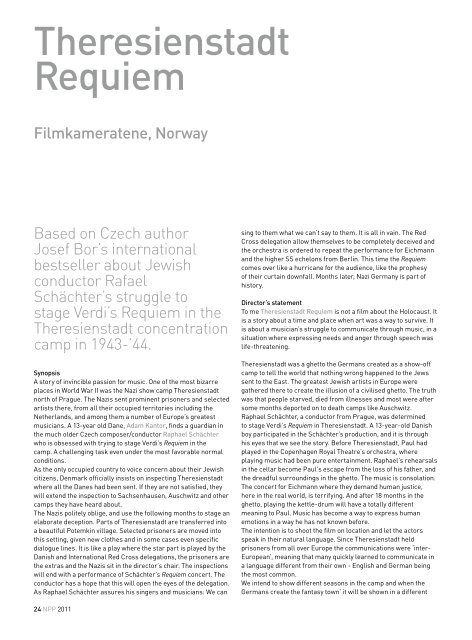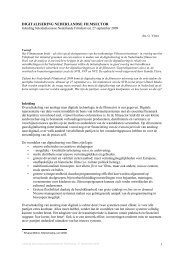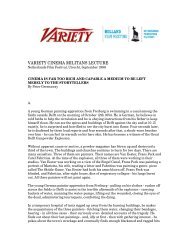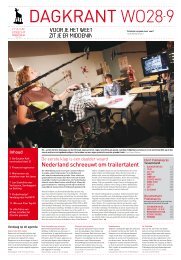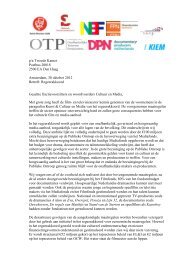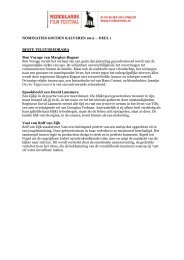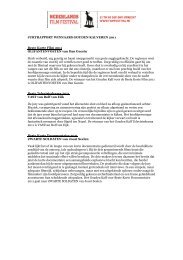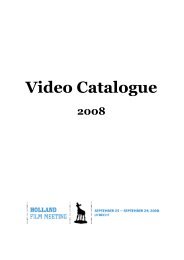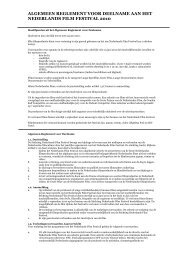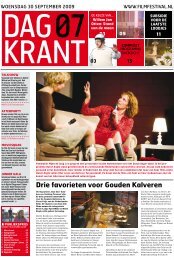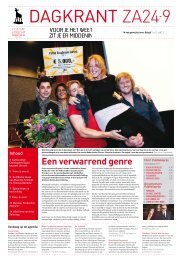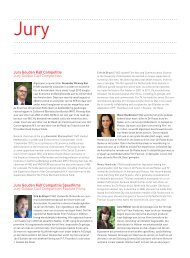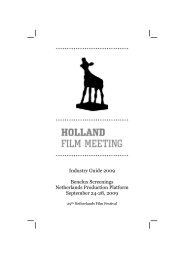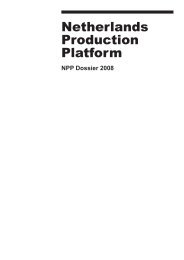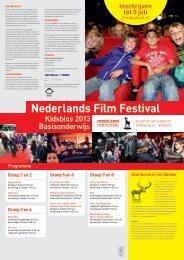Netherlands Production Platform dossier 2011 - Nederlands Film ...
Netherlands Production Platform dossier 2011 - Nederlands Film ...
Netherlands Production Platform dossier 2011 - Nederlands Film ...
Create successful ePaper yourself
Turn your PDF publications into a flip-book with our unique Google optimized e-Paper software.
Theresienstadt<br />
Requiem<br />
<strong>Film</strong>kameratene, Norway<br />
Vibeke Idsøe<br />
Based on Czech author<br />
Josef Bor’s international<br />
bestseller about Jewish<br />
conductor Rafael<br />
Schächter’s struggle to<br />
stage Verdi’s Requiem in the<br />
Theresienstadt concentration<br />
camp in 1943-’44.<br />
Synopsis<br />
A story of invincible passion for music. One of the most bizarre<br />
places in World War II was the Nazi show camp Theresienstadt<br />
north of Prague. The Nazis sent prominent prisoners and selected<br />
artists there, from all their occupied territories including the<br />
<strong>Netherlands</strong>, and among them a number of Europe’s greatest<br />
musicians. A 13-year old Dane, Adam Kantor, finds a guardian in<br />
the much older Czech composer/conductor Raphael Schächter<br />
who is obsessed with trying to stage Verdi’s Requiem in the<br />
camp. A challenging task even under the most favorable normal<br />
conditions.<br />
As the only occupied country to voice concern about their Jewish<br />
citizens, Denmark officially insists on inspecting Theresienstadt<br />
where all the Danes had been sent. If they are not satisfied, they<br />
will extend the inspection to Sachsenhausen, Auschwitz and other<br />
camps they have heard about.<br />
The Nazis politely oblige, and use the following months to stage an<br />
elaborate deception. Parts of Theresienstadt are transferred into<br />
a beautiful Potemkin village. Selected prisoners are moved into<br />
this setting, given new clothes and in some cases even specific<br />
dialogue lines. It is like a play where the star part is played by the<br />
Danish and International Red Cross delegations, the prisoners are<br />
the extras and the Nazis sit in the director’s chair. The inspections<br />
will end with a performance of Schächter’s Requiem concert. The<br />
conductor has a hope that this will open the eyes of the delegation.<br />
As Raphael Schächter assures his singers and musicians: We can<br />
sing to them what we can’t say to them. It is all in vain. The Red<br />
Cross delegation allow themselves to be completely deceived and<br />
the orchestra is ordered to repeat the performance for Eichmann<br />
and the higher SS echelons from Berlin. This time the Requiem<br />
comes over like a hurricane for the audience, like the prophesy<br />
of their curtain downfall. Months later, Nazi Germany is part of<br />
history.<br />
Director’s statement<br />
To me Theresienstadt Requiem is not a film about the Holocaust. It<br />
is a story about a time and place when art was a way to survive. It<br />
is about a musician’s struggle to communicate through music, in a<br />
situation where expressing needs and anger through speech was<br />
life-threatening.<br />
Theresienstadt was a ghetto the Germans created as a show-off<br />
camp to tell the world that nothing wrong happened to the Jews<br />
sent to the East. The greatest Jewish artists in Europe were<br />
gathered there to create the illusion of a civilised ghetto. The truth<br />
was that people starved, died from illnesses and most were after<br />
some months deported on to death camps like Auschwitz.<br />
Raphael Schächter, a conductor from Prague, was determined<br />
to stage Verdi’s Requiem in Theresienstadt. A 13-year-old Danish<br />
boy participated in the Schächter’s production, and it is through<br />
his eyes that we see the story. Before Theresienstadt, Paul had<br />
played in the Copenhagen Royal Theatre’s orchestra, where<br />
playing music had been pure entertainment. Raphael’s rehearsals<br />
in the cellar become Paul’s escape from the loss of his father, and<br />
the dreadful surroundings in the ghetto. The music is consolation.<br />
The concert for Eichmann where they demand human justice,<br />
here in the real world, is terrifying. And after 18 months in the<br />
ghetto, playing the kettle-drum will have a totally different<br />
meaning to Paul. Music has become a way to express human<br />
emotions in a way he has not known before.<br />
The intention is to shoot the film on location and let the actors<br />
speak in their natural language. Since Theresienstadt held<br />
prisoners from all over Europe the communications were ‘inter-<br />
European’, meaning that many quickly learned to communicate in<br />
a language different from their own - English and German being<br />
the most common.<br />
We intend to show different seasons in the camp and when the<br />
Germans create the fantasy town’ it will be shown in a different<br />
light than the rest of the film. Since I heard this story I have felt<br />
that it must be brought to the screen. It had the same impact on<br />
me as The Pianist and Schindler’s List.<br />
Director<br />
The films that Vibeke Idsøe has directed and/or written have<br />
sold 1,260,000 tickets in Norway (population 4,500,000) - an<br />
average of 315,000 per film. This is the highest audience figure<br />
for any Norwegian writer/director. She has been awarded an<br />
Amanda (Norway’s Oscar equivalent) for best debut, as well as<br />
Scandinavia’s most prestigious film prize, The Grand Nordic Prize,<br />
at Gothenburg International <strong>Film</strong> Festival. Other awards include<br />
Best <strong>Film</strong> at Chicago’s International Children’s <strong>Film</strong> Festival, the<br />
Grand Prize of European Fantasy <strong>Film</strong> in Silver at Fantasporto, as<br />
well as the Lucio Fulvi Award for Best Debut at the same festival.<br />
<strong>Production</strong> company<br />
<strong>Film</strong>kameratene is Norway’s most successful film production<br />
company. It has been active since 1986 and has consistently<br />
delivered box office hits to Norwegian cinemas. The company<br />
is also known for a unique series of ‘firsts’ in Norwegian film.<br />
It was the first company to make a film in the indigenous Sami<br />
language, the first to co-produce with a Hollywood Studio, the<br />
first to get a film remade in Hollywood, the first to make a full<br />
length animated feature, the first to produce a CGI special effects<br />
movie and the first to produce a 3D animated television series<br />
for children. <strong>Film</strong>kameratene’s two latest films are Troll Hunter,<br />
the biggest Norwegian export success ever, and the World War<br />
II drama Max Manus, the biggest box-office success in 30 years<br />
in Norway. <strong>Film</strong>kameratene has won a number of national and<br />
international awards and been nominated both for an Oscar and<br />
an International Emmy.<br />
Current status<br />
The project is currently in pre-production, with the following<br />
partners on board: the Norwegian <strong>Film</strong> Institute, the Nordisk <strong>Film</strong><br />
& TV Fond (Norway), B&T <strong>Film</strong> (Germany) and <strong>Film</strong> Group 111<br />
(Czech Republic). Finance in place: €3,500,000.<br />
Aims at the NPP<br />
To find a Dutch co-production partner and other European<br />
partners.<br />
John M. Jacobsen<br />
Director<br />
Vibeke Idsøe<br />
Producer<br />
John M. Jacobsen<br />
Sveinung Golimo<br />
Writer<br />
Vibeke Idsøe<br />
Based on<br />
Josef Bor’s international<br />
best-selling novel<br />
Languages<br />
English, German,<br />
Danish and others<br />
Genre<br />
Drama<br />
Running time<br />
90 mins<br />
Target audience<br />
Adults, music lovers,<br />
World War II aficionados<br />
Budget<br />
€8,125,000<br />
Sveinung Golimo<br />
Contact<br />
John M. Jacobsen<br />
<strong>Film</strong>kameratene AS<br />
Dronningensgate 8 A, PO Box 629 Sentrum<br />
0106 Oslo<br />
Norway<br />
Phone: +47 233 553 00<br />
Email: jmj@filmkameratene.no<br />
www.filmkaneratene.no<br />
24 NPP <strong>2011</strong><br />
<strong>2011</strong> NPP 25


